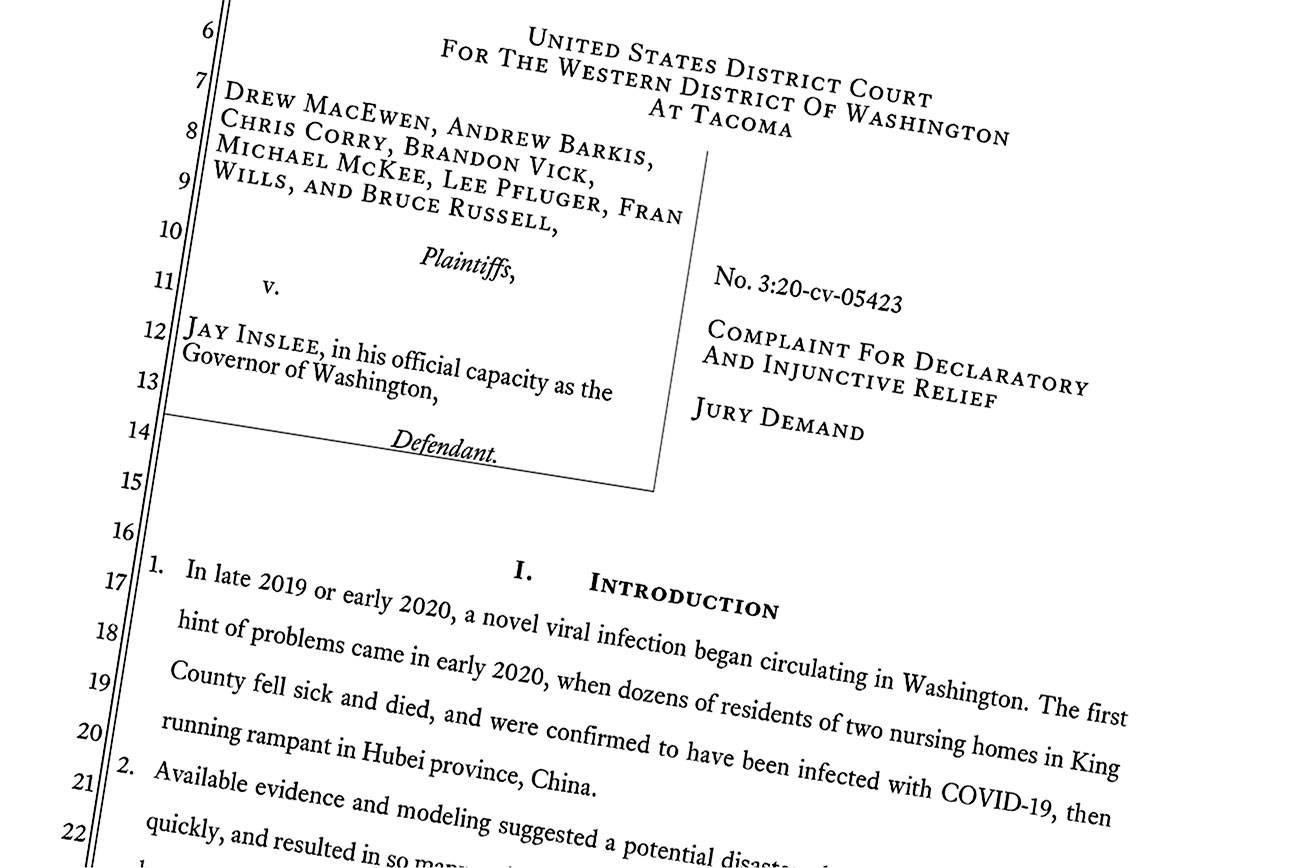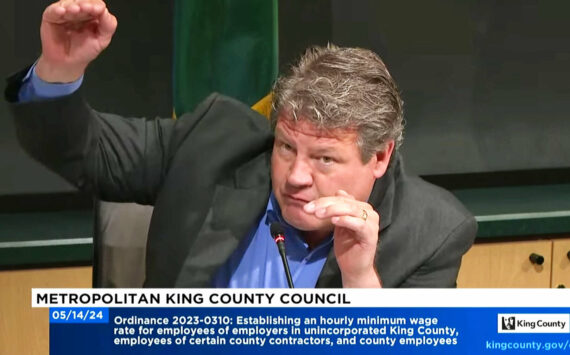A handful of Republican lawmakers have filed a lawsuit against Gov. Jay Inslee’s emergency declaration that shut down Washington state in light of the COVID-19 pandemic.
The suit, filed May 5, alleges “there is no longer an emergency in the state,” and that Inslee’s various coronavirus-related proclamations have unduly infringed upon various Constitutionally-protected rights. For relief, it’s asking for the governor’s proclamations to be declared unconstitutional and bar him and his administration from enforcing them.
Other plaintiffs include Reps. Andrew Barkis (R-Lacey), Chris Corry (R-Yakima), Drew MacEwan (R-Union), and Brandon Vick (R-Vancouver), as well as a number of Washington residents.
“The facts, and the science, are clear: when the entirety of public knowledge is examined, there is no public disorder or threat to the public disorder in the State of Washington,” the suit continued, making a reference to RCW 43.06.010, which describes when a Washington governor may declare a state of emergency. “The governor’s claim to the contrary is demonstrably false.”
According to the RCW, “The governor may, after finding that a public disorder, disaster, energy emergency, or riot exists within this state or any part thereof which affects life, health, property, or the public peace, proclaim a state of emergency in the area affected.”
The lawsuit begins by acknowledging early models of the virus showed “that within weeks, even with social distancing, Washington state would run out of hospital beds, ICU beds, and ventilators,” leading to an overwhelmed hospital system, which would in turn cause additional deaths as those who needed care would be unable to receive it.
But “over the weeks since the state has imposed limits on its citizens’ Constitutional rights, more and more data have emerged regarding COVID-19. It has been almost unabated good news,” the suit continued, listing that “far fewer” people needed major medical intervention than expected; that the state’s hospital system was not overburdened with patients and that ventilator supplies even became a surplus; that social distancing slowed the rate of infection “beyond even early predictions of transmission;” and there have been far fewer deaths than what was estimated early on.
The lawsuit alleges there have been no COVID-19-related deaths of people under the age of 20, and that 50 percent of all the deaths have been among people who were over the age of 80.
The suit noted that as of May 3, 841 people have died of the virus. As of May 22, that number has increased to more than 1,000, according to the state Department of Health.
Updated data from the Department of Health also shows that 52 percent of all COVID-19 deaths occurred to the 80-year-plus group, and that the ages 60 to 79 group suffered 39 percent of all deaths.
While there have been no deaths of people ages 20 and below reported in Washington state, the Washington Post has reported nine deaths nationwide in that age group in an April 8 article.
An official response has yet to be filed by Inslee. His press secretary Mike Faulk said the lawsuit appears to misunderstand basic aspects of public health, the clear constitutional authority and the governor’s obligation to protect the public.
“The lawsuit says there is no crisis because COVID-19 is most deadly to older people and those with underlying health issues,” Faulk said. “The governor called it ‘biologically ignorant and humanly heartless’ and I think that’s an accurate summation.”
COMPARING PUBLIC HEALTH THREATS
One of the lawsuit’s allegations is that there cannot be an emergency situation if the 2020 death rate is similar to past years.
“If the threat to public health posed by COVID-19 is not extremely dissimilar than other threats to public health that regularly arise in the state, then ‘emergency’ ceases to have meaning other than ‘Governor’s fiat,’” it reads.
As an example, the lawsuit compares the 1,000-plus coronavirus deaths to the 809 people who died of the flu and pneumonia in 2016. There were 1,037 flu and pneumonia deaths in 2017, and 988 in 2018, with the total number of deaths for those years staying in the 55,000 – 57,000 range.
The CDC reports comparable numbers, with the biggest disparity being in 2018, when the organization reported 930 flu/pneumonia deaths.
However, the lawsuit does not compare the reported positive test rate between the flu and the novel coronavirus.
According to the DOH, public health labs tracked an estimated 700 flu cases between Jan. 1 and May 31 of the 2018-2019 flu season, and commercial labs reported an estimated 7,000, for a total of around 7,700 flu cases during those four months. It is likely that these numbers underreport the number of actual flu cases.
At mid-May, Washington state has seen about 18,600 COVID-19 cases, a number that is also likely underreported, given that CDC director Robert Redfield stated that up to 25 percent of those infected with the virus are asymptomatic.
Redfield also said COVID-19 is “probably now about three times as infectious as flu,” a point not mentioned in the lawsuit.
‘A SMALL SUBSET OF THE POPULATION’
The lawsuit also claims there cannot be a statewide emergency if circumstances only affect a small portion of the state’s residents.
“If any emergency is confined to certain small subsets of the population, the Governor’s statewide edict cannot be justified,” the lawsuit reads, claiming that up to 90 percent of all COVID-19 deaths in the state have been attributed to those ages 60 and older.
However, the lawsuit does not note how many people in Washington are 60 years old or older. According to the 2010 Census, nearly 1.21 million Washingtonians were 60 years of age or older, or around 18 percent of the 6.7 million total residents.
Statistica reports that the percentage of older residents has increased to 21.7 percent in 2018.
Also most at risk are people with underlying medical conditions (especially seniors), many health authorities have said. The lawsuit criticizes the Washington state Department of Health for not releasing information regarding how many COVID-19-related deaths involved a patient with an underlying condition (otherwise known as a co-morbidity).
The King County health department has tracked that data in regard to patients living at a long-term care facility. About 35 percent of COVID patients in these facilities had some sort of co-morbidity, whereas about 24 percent did not. It is unknown if the other roughly 42 percent of COVID patients have an underlying condition.
The most common underlying medical issues with COVID-19 patients include heart disease (19 percent of patients; 42 percent unknown), diabetes (12 percent of patients; 42 percent unknown), and kidney diseases (10 percent of patients; 54 percent unknown).
According to America’s Health Rankings, which claims to perform the longest-running annual assessment of the nation’s health on a state-by-state basis, around 3.8 percent of Washingtonians (or nearly 255,000 people) were told they have heart disease in 2019.
America’s Health Rankings also reports around 10 percent of state residents (or about 670,000 people) were told they have diabetes. No data about Washingtonian kidney disease numbers was available.
CASINOS BEFORE CHURCHES
Pointing specifically to the First Amendment, the lawsuit claims Inslee’s various directives infringe on Washingtonians’ right to freely worship, especially when various casinos around the state have reopened.
“Mass gatherings of revelers at a casino poses at least the same threat to public heath (meaning: nearly none) as would gathering for Mass at a Catholic church, or any other gathering of people to freely exercise their religion,” the lawsuit reads. “By allowing certain casinos to open, while limiting the right of people to freely exercise religion, and doing so with no factual or scientific bases, Inslee’s Proclamation demonstrates its unconstitutionality on its own terms.”
To put a personal touch on this issue, the lawsuit describes the situation of Bruce Russell, a Washington business owner of Lake Bowl in Moses Lake.
“For over 60 years and 3 generations of working family members, Lake Bowl has successfully and steadily grown its business,” the lawsuit reads, adding that since its closure, more than 100 employees were furloughed and 95 percent of income has evaporated. “Now, people will be able to congregate in large crowds to entertain themselves at a competitor business just down the road, while Lake Bowl will continue to be shuttered.”
The “competitor down the road” appears to be Papa’s Casino, but the venue is not entertaining people in its normal fashion, and is only allowing people to pick up take-out food, a manager said.
Other casinos around the state have opened, but those casinos are on tribal land.
“The governor has no control over tribal jurisdictions. Gov. Inslee has spoken with tribal leaders expressing his concerns about reopening casinos, that he would rather they not do it, but acknowledged they have that authority,” Faulk said. “The hospitality industry, which would include casinos, is in Phase 3 of the state’s plan.”
GOP Lawsuit against Gov. Ja… by Ray Still on Scribd








